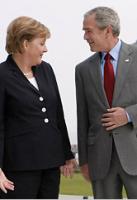President Bush locked horns with one of his strongest European allies, German Chancellor Angela Merkel, by blocking her bid for concrete long-term targets for reducing greenhouse gas emissions.
At the Group of 8 annual meeting in Germany, Merkel is advocating a plan to cut emissions in half by 2050 and to limit the rise in global temperature to two degrees Celsius. But Bush’s chief environmental adviser, James L. Connaughton, said the U.S. would not accept Merkel’s terms.
Merkel has staked her reputation on making real and significant progress on global warming during this year’s meeting. Bush said he intended to convene major polluting nations, including China and India, in meetings to set long-term goals by the end of 2008.
Subscribe to our newsletter
Stay up to date with DeSmog news and alerts







